

Updated December 19, 2024
Businesses should think critically about their brand and how they’re naturally positioned to make an impact. People want companies across industries to adopt policies of corporate social responsibility that protect the wellbeing of individuals, local communities, and the global community.
People expect businesses to do more than simply express support for a cause and call it corporate social responsibility; they want to see businesses act on social issues. However, corporate social responsibility is not “one size fits all.”
Businesses must consider their customers’ values, their brand's unique purpose, and where they can make the most impact when implementing a corporate social responsibility effort.
Clutch surveyed 420 consumers from across the U.S. who have made a purchase within the last six months to learn how they want businesses from different industries to show their commitment to social responsibility.
Looking for a Public Relations agency?
Compare our list of top Public Relations companies near you
In this report, businesses will learn how they should approach corporate social responsibility, what social issues are important for particular industries, and how public relations firms recommend businesses balance corporate social responsibility and their PR strategies.
Although PR and corporate social responsibility are closely linked, they should be viewed separately.
If a company approaches corporate social responsibility from a purely PR standpoint, they risk seeming unauthentic.
Conversely, if a company doesn’t consider its brand values or its audience’s values when committing to a social cause, they risk indifferent or negative reactions from their audience.
“Corporate social responsibility has PR value, but these programs should not be designed or executed just for PR purposes,” said Jen Bemisderfer, managing director of RH Strategic, a PR agency in Seattle.
“Audiences need to believe that businesses genuinely care about the issues that their corporate social responsibility programs address because people want to do business with companies whose values align with their own,” Bemisderfer said.
Companies may struggle to balance their PR strategies and corporate social responsibility. They can better achieve this balance by asking themselves:
Businesses that want to make corporate social responsibility a component of their brand mission must consider their unique audience and abilities.
No business is exempt from corporate social responsibility in the eyes of consumers.
In fact, people want all industries, from food and fashion to technology and beauty, to make corporate social responsibility a central component of their brand purpose.
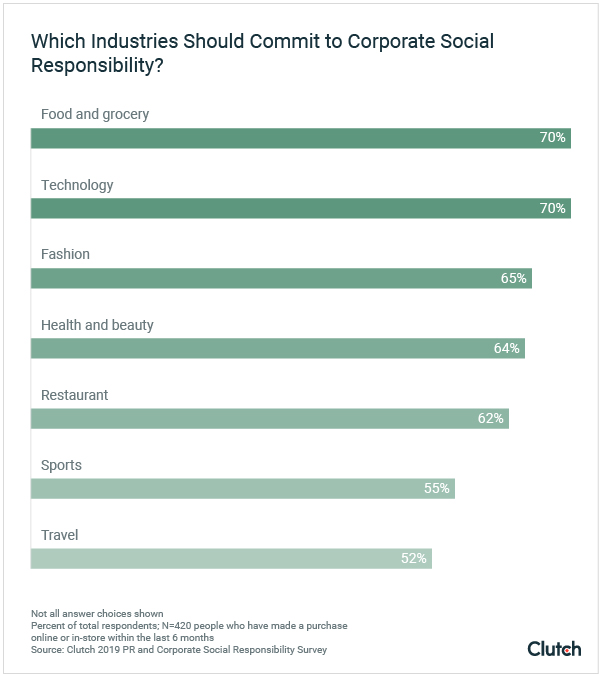
The majority of people think that all industries should commit to corporate social responsibility, frequently citing food-related industries, such as grocery retailers (70%) and restaurants (62%), as well as the technology (70%), and fashion (65%) industries as those they associate with corporate social responsibility most frequently.
Bemisderfer believes the food, fashion, and technology industries rank so highly because they are among the most intimate for customers.
“With food, you’re putting those things in your body,” Bemisderfer said. “With clothing, you’re wearing it on your body or next to your body. It might seem that technology wouldn’t fit along these lines, but we treat smartphones today as an extension of ourselves.”
The technology, food, and fashion industries may appear to be unrelated on the surface, but share more similarities than expected. Together, they give insight into how connected the world is and how businesses can support individuals, local communities, and the global community.
People often sacrifice their privacy in exchange for the convenience and connections that new technologies offer, but they want to know that their personal information is safe.
Seventy-two percent of people (72%) who think that the technology industry should commit to corporate social responsibility say that data protection is one of the most important causes it should support.
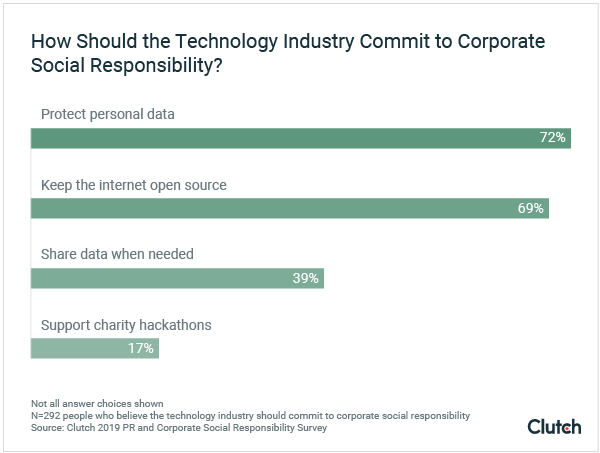
People are concerned about the future implications of giving their personal data to social media platforms, websites, and applications that track information such as geo-location and health metrics.
For example, since the 2018 Cambridge Analytica scandal and the associated Facebook data breach, Facebook has been criticized for not respecting users’ privacy and data.
The Cambridge Analytica scandal opened many people’s eyes to the dangers of sharing personal data, and broadened their definition of what needs “security.”
“Do you have security in your home?” said Michael Gargiulo, CEO of VPN.com, a website that offers Virtual Private Network (VPN) options for individuals and businesses. “Do you wear a seatbelt in your car? Do you have a VPN or anti-virus software? Security comes in many forms and people value security and their privacy.”
“Do you have security in your home? Do you wear a seatbelt in your car? Do you have a VPN or anti-virus software? Security comes in many forms and people value security and their privacy.”
Facebook’s ethical missteps are symptoms of much larger issues involving the technology industry and data privacy. Overall, consumers increasingly expect businesses to protect their data and are seeking education to protect themselves.
Businesses should pay attention to these consumer demands and implement social responsibility efforts accordingly.
For example, VPN.com launched a campaign that used hashtags such as #DeleteFacebook and #OurPrivacyMatters to increase awareness of issues regarding data protection and privacy.
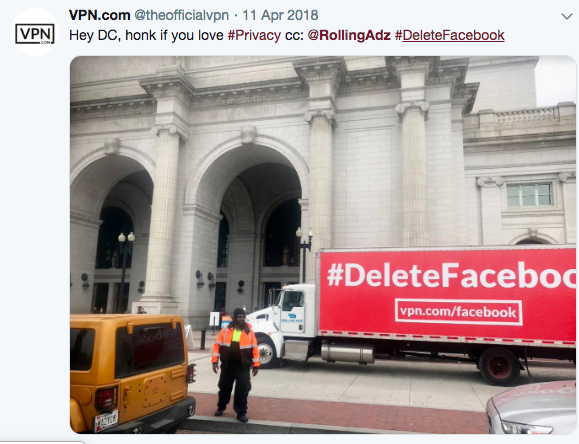
The campaign aimed to educate people on how to properly delete Facebook and how to manage privacy settings for those who were not able to delete it. #DeleteFacebook is still trending as people learn more about how Facebook may be misusing their users’ data. The movement's popularity shows that people care about how the technology industry uses their data and displays the need for more education about privacy settings.
Awareness days, such as Data Privacy Day on January 28, also encourage people to be mindful about what they post online, the information they give to websites and apps, and their privacy settings.
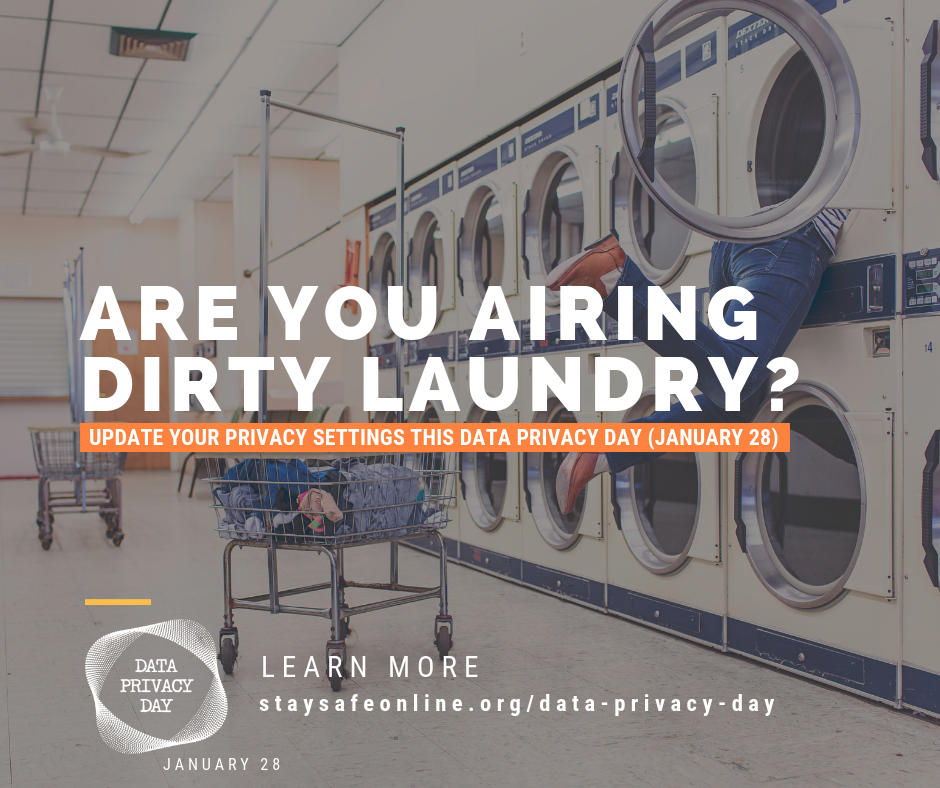
Businesses can use campaigns like #DeleteFacebook and awareness days to educate their customers while working with cybersecurity firms to make sure they’re protecting their customers’ data.
In the future, more businesses will be expected to uphold data privacy not only because consumers demand it, but because the law requires it.
Legislation - like the European Union’s General Data Protection Regulation (GDPR) and California’s California Consumer Protection Act (CCPA) - limits how businesses can use people's data and reflects consumers’ desire for greater privacy protection and transparency from businesses.
“What is most frustrating about the Cambridge Analytica and Facebook scandals is that people weren’t informed that something had happened until much later,” Gargiulo said. “One thing I love most about GDPR is it requires companies to disclose to the public in a short period of time that something happened. Protecting people’s data is just one part of it; being transparent when something happens is another part.”
Businesses, regardless of industry, need to consider how they’re working to protect customers’ personal information.
Companies, such as those in the technology industry, should consider how their business impacts individuals and what their customers need most from their socially responsible policies.
How a business chooses to approach corporate social responsibility depends on their brand and which issues align with their brand purpose.
People find it especially important for businesses in the food industry, including food retailers and restaurants, to give back directly to the local community.
More than two-thirds of people (67%) who say grocery retailers should commit to social responsibility cite feeding the local community as a specific action these retailers should take.
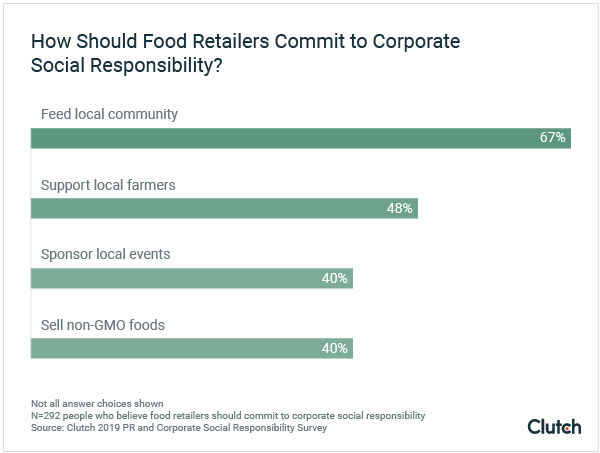
Similarly, 71% of people who say restaurants should commit to corporate social responsibility think restaurants should feed the local community.
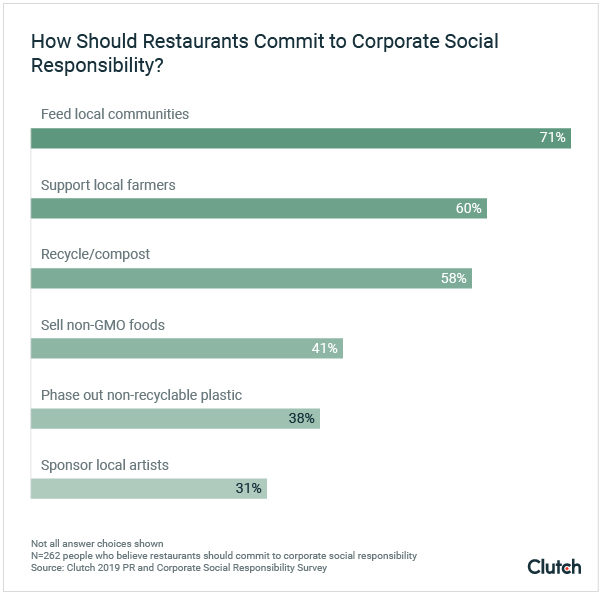
People see food retailers and restaurants as uniquely positioned to address hunger in their local communities.
In 2012, four friends started Chicken & Rice Guys, a food truck in Boston. Since then, it has grown into a business that takes chicken, rice, sauce, and corporate social responsibility very seriously.
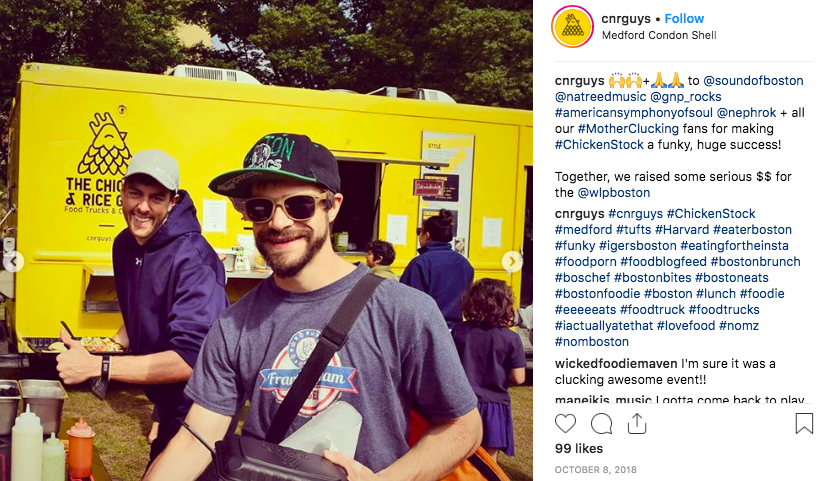
Steve Collicelli, business manager of Chicken & Rice Guys, said consumers now value more than just the cheapest price or best product.
“It’s not good enough to just do good by your customers with a good product at a good price; they will direct their dollars to companies that do that and take care of their people and their community,” Collicelli said. “Nowhere is this more apparent than in the food industry where we interact directly with our customers on a daily and intimate basis as they literally consume our product.”
Chicken & Rice Guys do simple things to support the local community such as donating surplus food at the end of shifts to organizations like the Boston Rescue Mission, which works to feed the homeless population in Boston. Actions like these are low cost with high impact.
“Being a modern, socially-conscious company means reflecting honestly on how we impact the communities within which we operate,” Collicelli said. “Making and serving hot, delicious food is what we do best, so it’s only natural we focus on issues of food insecurity and hunger within our community.”
As a mobile food truck, the Chicken & Rice Guys saw that feeding the local population was a natural fit for their business.
Businesses, such as those in the food industry, should consider which issues or causes are a natural fit for their brand when committing to a corporate social responsibility effort.
Businesses’ complex supply chains reflect how connected the world is.
The fashion industry, for example, encompasses clothing, jewelry, and accessories, all of which rely heavily on a global infrastructure.
Of those who think the fashion industry should commit to corporate social responsibility, 58% cite using ethically-sourced materials as one of the top actions businesses in this industry should take.
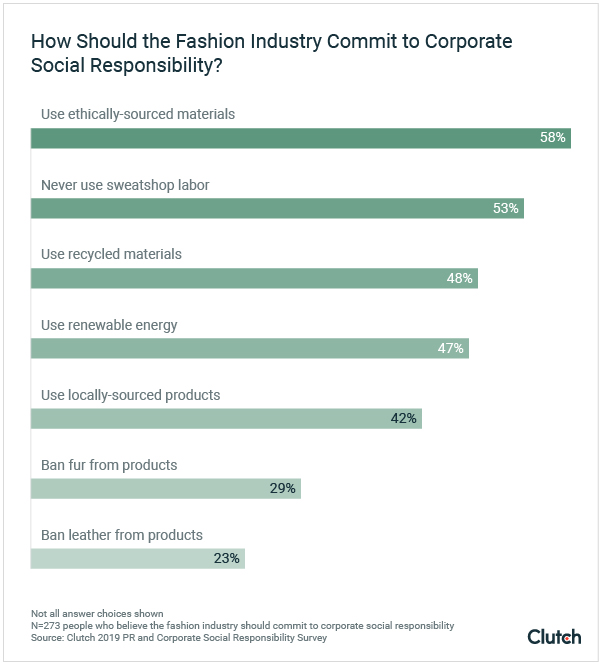
Items that we buy are passed through hundreds of hands across different continents before they end up in stores. People care about how these products get into their local mall or boutique.
Diamonds, for example, are one of the world’s most valuable commodities: People demand them, and jewelers want to supply them but to do so requires an intensive amount of human labor.
Brilliant Earth is among the few fine jewelry companies focusing its brand purpose on corporate social responsibility. The company ensures that their diamonds are ethically-sourced in a way that has not harmed individuals, communities, or the environment.
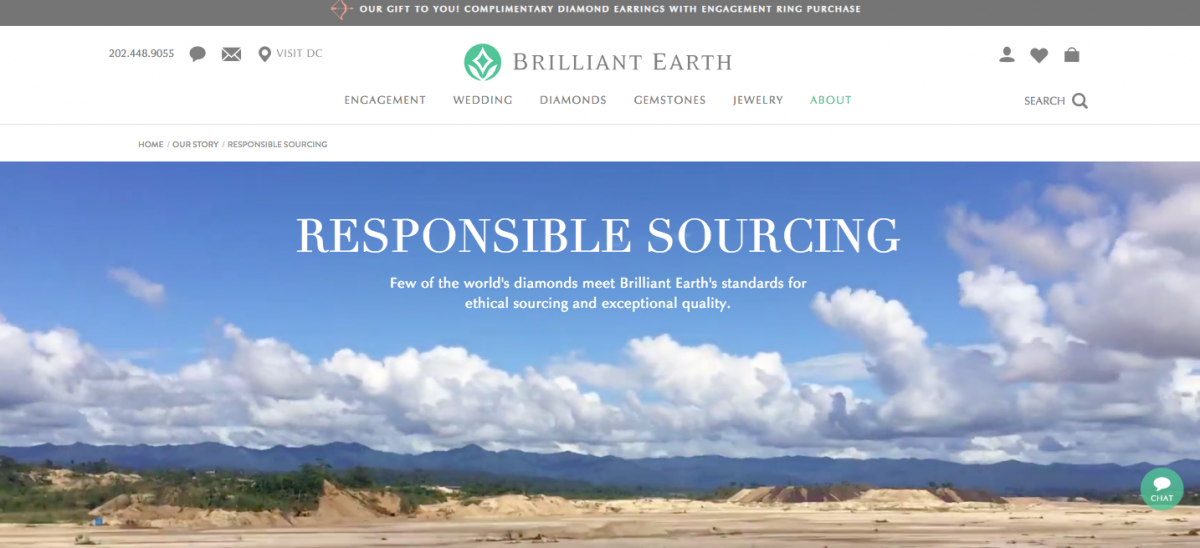
Brilliant Earth goes “Beyond Conflict Free” to show that they exceed the minimum requirements set forth by the Kimberley Process, an international trade initiative that aims to prevent "conflict diamonds" from entering the marketplace.

Brilliant Earth's "Beyond Conflict-Free" diamonds:
Brilliant Earth supports community development efforts by offering educational programs to help communities around the world.
“We believe there should be no compromise between quality and consciousness in the fine jewelry industry and beyond,” said Beth Gerstein, co-founder and co-CEO of Brilliant Earth. “In recent years, we have seen increasing interest from consumers in understanding how and where their products are sourced and in supporting companies that use business for positive social change.”
Because their industry is inherently global, Brilliant Earth’s corporate social responsibility efforts consider how they not only impact individuals and the local community, but the wider global community.
Businesses, such as those in the fashion industry, should consider the scope of their business and how they can make the most impact, whether on an individual, local, or global scale.
The variables that make businesses unique – their industry, brand, customers, and scope – offer unique windows of opportunity for corporate social responsibility.
Businesses can approach corporate social responsibility in a way that both preserves authenticity and positively impacts their PR strategy if they consider their industry and brand purpose.
“Businesses need to look at what their own brand is and what aligns with their brand,” said Bob Gold, CEO of Bob Gold & Associates, a PR firm in California. “You always want to stay close to the mission of the brand so that it’s an authentic statement and consistent with the brand’s values.”
“Businesses need to look at what their own brand is and what aligns with their brand. You always want to stay close to the mission of the brand so that it’s an authentic statement and consistent with the brand’s values."
It is important for businesses to stay consistent with their brand and adopt policies that make sense for their industry. The Chicken & Rice Guys, for example, saw that as a mobile food truck they were naturally positioned to address local food insecurity.
Businesses should also consider what their customers want, which will vary among businesses, even those within the same industry.
“Businesses need to decide what they believe in and how these beliefs relate to their customers,” said Darian Kovacs, CEO of Jelly Marketing and PR firm in Canada. “To do this, they need to know exactly who their target audience is.”
The technology industry, for example, has been criticized for not protecting people’s personal information. As a result, consumers want the technology industry to commit to protecting their sensitive data and privacy.
By getting to know their customers, businesses will better understand which actions they should support the most. This, of course, depends on the company’s scope.
“If you have a global business, you’re going to be in a better position to make a global impact with your CSR campaign,” Bemisderfer said. “If you’re a local, small, or medium-sized business, you can have effective CSR campaigns reaching your local community.”
“If you have a global business, you’re going to be in a better position to make a global impact with your CSR campaign. If you’re a local, small, or medium-sized business, you can have effective CSR campaigns reaching your local community.”
Some businesses are naturally positioned to make an impact on a global scale, while others are more naturally positioned to impact the local community. No level of impact is more or less important than another; it simply depends on each business’s scope.
Consumers are more aware of how their buying decisions can impact the world around them and expect companies to be socially responsible. Businesses can meet these expectations by considering how they’re uniquely positioned to make the greatest impact.
PR and corporate social responsibility are not synonymous, but understanding the best practices of PR agencies can help businesses decide how to approach corporate social responsibility.
Businesses across industries, whether technology, food, fashion, or otherwise, can approach corporate social responsibility in different ways to achieve multiple levels of impact.
Consumers expect certain initiatives from industries, based on how these industries impact their personal life, local communities, or global communities.
People increasingly care about data privacy and want the technology industry to commit to keeping data secure. They also care about the local community and want businesses in the food industry to help address food insecurity by feeding those in need.
Finally, consumers care about the global community and want businesses that rely on a global supply chain, like the fashion industry, to pay attention to how they source materials, treat their workers, and impact the communities that host them.
Businesses should consider their brand, customers, and scope while building a corporate social responsibility strategy.
Clutch surveyed 420 people from across the U.S. who have made a purchase either in-store or online within the last six months.
Most survey respondents are male (57%), and 43% are female.
Thirty-five percent (35%) are millennials (ages 18-34), 48% are Generation Xers (ages 25-54), and 16% are baby boomers (ages 55+).


